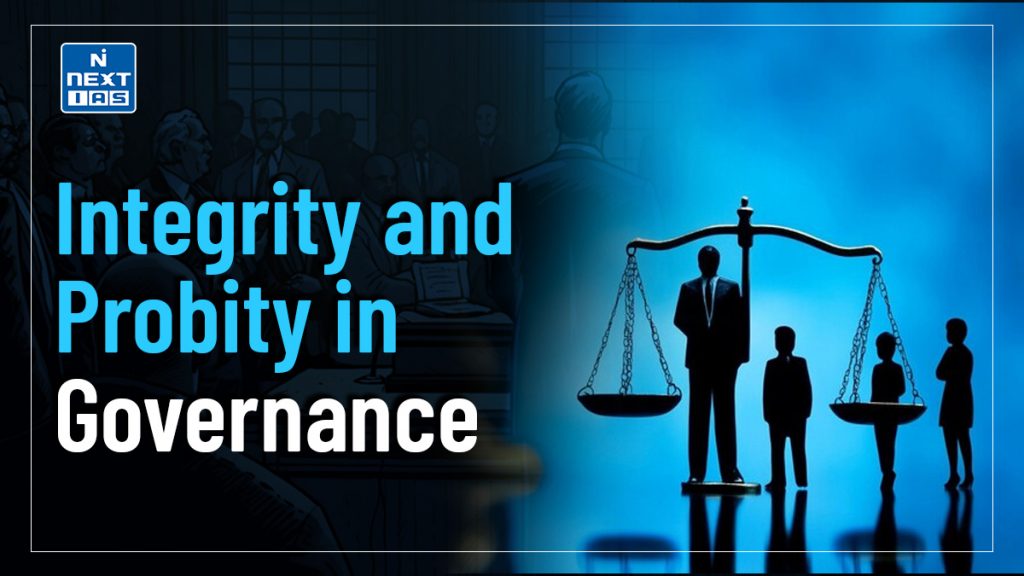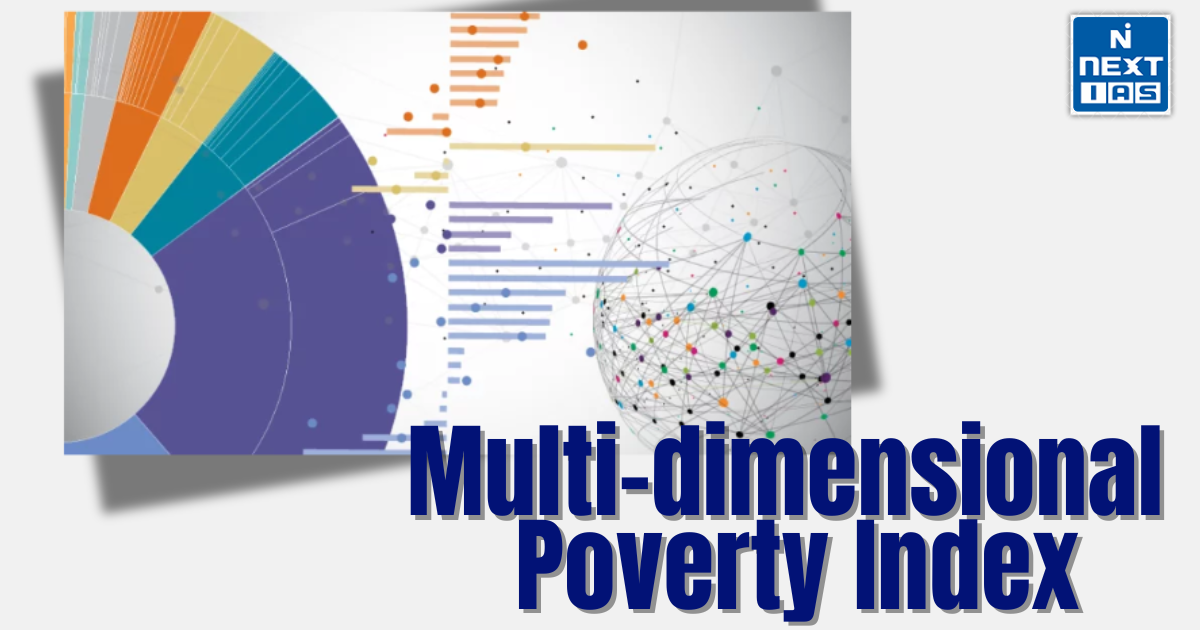
Integrity and probity are indispensable in governance, forming the ethical backbone of public administration. They uphold transparency, accountability, and fairness in decision-making, ensuring that the actions of public officials align with the principles of justice and public welfare. This article aims to study in detail the concepts of integrity and probity in governance, exploring their significance in ensuring trust in public institutions.
What is Integrity in Governance?
- Integrity in governance refers to steadfast adherence to moral and ethical principles.
- It involves consistency between actions, values, and public commitments.
- For instance, a public official showing integrity would prioritize public interest over personal gain, ensuring honesty in resource allocation and decision-making processes.
What is Probity in Governance?
- Probity emphasizes honesty, uprightness, and adherence to moral rectitude in public life.
- It ensures that public officials act impartially, avoid conflicts of interest, and resist any temptation to misuse power or resources.
- For example, a transparent tendering process for public contracts reflects probity in governance.
Key Elements of Integrity and Probity in Governance
- Transparency: Transparency involves making government operations and decisions open to public scrutiny.
- For example, publishing public expenditure reports, open data portals, and transparent budgetary allocations ensure citizens can monitor the government’s performance.
- Accountability Mechanisms: Accountability ensures that public servants and institutions are answerable to the people.
- Mechanisms include parliamentary oversight, judicial review, social audits, and the role of independent regulatory bodies like the Comptroller and Auditor General (CAG).
- Rule of Law: Governance must adhere to the principle that no one is above the law, ensuring equality before the law and impartial enforcement.
- A robust legal framework discourages abuse of power and promotes fairness in administration.
- Conflict of Interest Management: Policies to prevent personal interests from influencing official decisions are critical for probity.
- Mandatory disclosure of assets by public officials and guidelines for recusal in case of personal involvement are examples.
- Citizen Participation: Engaging citizens in governance processes promotes inclusivity and ensures that public policies reflect societal needs.
- Participatory budgeting and public consultations exemplify this approach.
Challenges to Integrity and Probity in Governance
- Corruption: Corruption is a major impediment to ethical governance, eroding public trust and diverting resources away from developmental activities. Examples include bribery, nepotism, and embezzlement in public procurement processes.
- Lack of Transparency: Opaque procedures and closed decision-making processes hinder accountability and create opportunities for malpractice.
- Conflict of Interest: Overlapping personal and professional interests can lead to biased decision-making, undermining public welfare.
- Weak Institutional Mechanisms: Regulatory and oversight bodies often lack independence, resources, or the authority to act effectively.
- Cultural and Social Norms: In societies where unethical practices are normalized, it becomes challenging to enforce integrity and probity.
- Political Influence: Politicization of administrative processes undermines impartiality and leads to favoritism.
Measures to Promote Integrity and Probity in Governance
- Legislative and Policy Frameworks: Laws like the Right to Information Act (RTI), 2005 empower citizens to demand transparency.
- The Whistleblower Protection Act, 2014 safeguards individuals exposing unethical practices.
- Strengthening Institutions: Independent bodies like the Lokpal and Lokayuktas, Central Vigilance Commission (CVC), and CAG need enhanced powers and resources to act effectively.
- Ethical Codes and Conduct: Clear guidelines for public officials help create a culture of accountability.
- The Model Code of Conduct during elections is an example of promoting ethical behavior.
- Capacity Building and Training: Regular ethics training programs for civil servants and public officials emphasize the importance of integrity in governance.
- Technology Integration: Digital platforms reduce human discretion, enhancing transparency and reducing corruption.
- Examples include e-procurement systems and online grievance redressal portals.
- Promoting a Culture of Ethics: Public awareness campaigns and value-based education can instill a culture of integrity.
- Social Audit and Citizen Oversight: Tools like social audits enable communities to monitor and evaluate public projects, ensuring accountability.
Global Best Practices in Integrity and Probity
- Singapore: Known for its zero-tolerance approach to corruption, with stringent laws and ethical civil service practices.
- New Zealand: Implements open government policies and ranks consistently high in transparency indices.
- Sweden: Ombudsman institutions address citizen grievances and promote accountability.
Importance of Integrity and Probity in Governance
- Building Public Trust: Citizens’ confidence in government institutions is directly linked to the perceived integrity of those in power.
- When leaders demonstrate honesty and fairness, people are more likely to cooperate with government initiatives, pay taxes willingly, and support public programs.
- Enhancing Accountability: Ethical governance ensures that public officials are held accountable for their decisions and actions.
- Mechanisms like audits, public inquiries, and oversight bodies enable citizens to question and evaluate governance practices.
- Efficient Resource Utilization: When corruption and mismanagement are minimized, public resources can be used effectively for development.
- For instance, direct benefit transfer (DBT) schemes reduce leakage and ensure subsidies reach the intended beneficiaries.
- Fostering Economic Growth: Integrity in governance creates a conducive environment for business and investment.
- Transparent policies reduce uncertainties, lower transaction costs, and attract foreign direct investment (FDI).
- Strengthening Democracy: Probity ensures that power is exercised responsibly, upholding the principles of equality, justice, and fairness.
- Ethical governance safeguards democratic values by preventing misuse of authority and promoting the rule of law.
Way Forward
- Institutional Reforms: To strengthen anti-corruption bodies, ensure judicial independence, and enhance mechanisms for whistleblower protection.
- Ethics in Education: To introduce courses on ethics and integrity in schools and colleges to inculcate values from an early age.
- Public Awareness Campaigns: To educate citizens about their rights and the importance of ethical governance through campaigns and workshops.
- Regular Monitoring and Evaluation: To conduct periodic assessments of governance practices to identify and address shortcomings.
- Global Collaboration: To collaborate with international organizations to adopt best practices and align with global ethical standards.
Conclusion
Integrity and probity are essential for good governance, fostering trust, ensuring accountability, and promoting sustainable development. While challenges remain, collective efforts from policymakers, civil servants, civil society, and citizens can create a governance framework rooted in ethical principles. Upholding these values is crucial for the progress of a democratic and equitable society.
FAQs
What is the meaning of probity and integrity?
Probity means honesty, strong moral principles, and adherence to ethical standards, especially in public life. Integrity refers to consistency in moral and ethical values, ensuring truthfulness, fairness, and accountability. While probity focuses on upright conduct, integrity encompasses overall character, guiding individuals to act justly in all situations.
What is integrity in governance?
Integrity in governance means upholding honesty, transparency, and ethical standards in public administration. It ensures accountability, fairness, and the absence of corruption in decision-making. Leaders with integrity prioritize public welfare over personal gain, fostering trust, good governance, and sustainable development in a nation’s political and administrative systems.
What is probity in governance?
– Probity in governance refers to integrity, honesty, and ethical conduct in public administration. It ensures transparency, accountability, and fairness in decision-making, preventing corruption and misconduct. Probity promotes trust in government institutions by upholding principles like impartiality, rule of law, and responsible use of public resources for the common good.
– Above are given Examples of probity in governance.
What does integrity mean in government?
Integrity in government means maintaining honesty, transparency, and ethical behavior in public administration. It involves accountable leadership, corruption-free decision-making, and adherence to laws and moral principles. A government with integrity prioritizes public welfare, ensures fairness, and fosters trust among citizens by upholding justice, accountability, and responsible governance.






